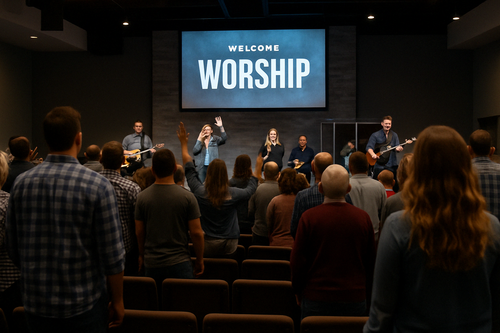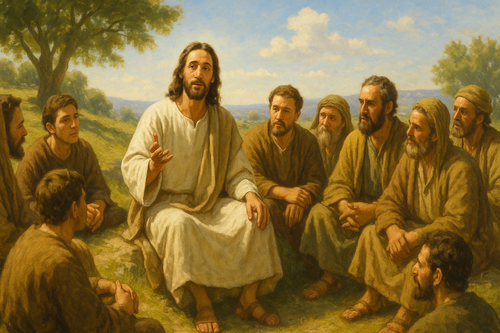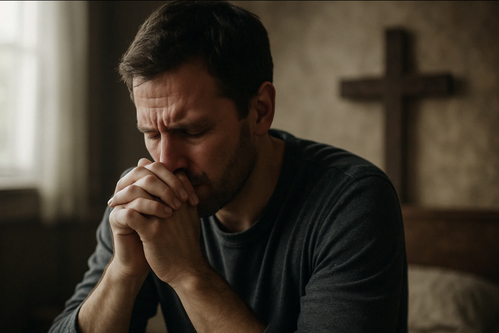The Ultimate Sacrifice

Christians celebrate one of the most pivotal events in their faith: the resurrection of Jesus Christ. At the heart of this celebration lies a profound truth that often goes overlooked – Jesus' death was not a tragedy or an accident, but a deliberate and voluntary sacrifice.
John 10:17-18 captures this truth beautifully: "The Father loves me because I sacrifice my life so I may take it back again. No one can take my life from me. I sacrifice it voluntarily. For I have the authority to lay it down when I want to and also to take it up again. For this is what my Father has commanded."
These words reveal a startling reality – no one, not even the most powerful beings, could take Jesus' life from Him. His death was entirely His choice, a voluntary offering made out of love and obedience to God's plan. This wasn't a random event or a cruel twist of fate. It was a meticulously orchestrated divine plan to save humanity from the consequences of sin.
John 10:17-18 captures this truth beautifully: "The Father loves me because I sacrifice my life so I may take it back again. No one can take my life from me. I sacrifice it voluntarily. For I have the authority to lay it down when I want to and also to take it up again. For this is what my Father has commanded."
These words reveal a startling reality – no one, not even the most powerful beings, could take Jesus' life from Him. His death was entirely His choice, a voluntary offering made out of love and obedience to God's plan. This wasn't a random event or a cruel twist of fate. It was a meticulously orchestrated divine plan to save humanity from the consequences of sin.

The magnitude of this sacrifice becomes even more apparent when we consider that Jesus repeatedly tried to prepare His disciples for what was to come. On at least three separate occasions, He spoke directly and explicitly about His impending death and resurrection. Yet, His followers struggled to grasp the concept, their minds clouded by preconceived notions of what the Messiah should be.
It's a reminder of how our own expectations and beliefs can sometimes blind us to God's greater plan. The disciples, like many Jews of their time, expected a conquering Messiah who would overthrow Roman rule and restore Israel's glory. They couldn't fathom a Messiah who would suffer and die, even though Jesus plainly told them it was necessary.
This necessity is highlighted in Luke 9:22, where Jesus says, "The Son of man must suffer many things, and be rejected of the elders and chief priests and scribes, and be slain, and be raised the third day." The Greek word used for "must" implies absolute necessity. Jesus' death and resurrection weren't just possibilities – they were essential components of God's plan for humanity's salvation.
It's a reminder of how our own expectations and beliefs can sometimes blind us to God's greater plan. The disciples, like many Jews of their time, expected a conquering Messiah who would overthrow Roman rule and restore Israel's glory. They couldn't fathom a Messiah who would suffer and die, even though Jesus plainly told them it was necessary.
This necessity is highlighted in Luke 9:22, where Jesus says, "The Son of man must suffer many things, and be rejected of the elders and chief priests and scribes, and be slain, and be raised the third day." The Greek word used for "must" implies absolute necessity. Jesus' death and resurrection weren't just possibilities – they were essential components of God's plan for humanity's salvation.

The events surrounding Jesus' arrest in the Garden of Gethsemane further illustrate His voluntary sacrifice. Despite knowing exactly what awaited Him, Jesus didn't try to hide or escape. Instead, He stepped forward to meet His captors, identifying Himself with the powerful words "I AM" – a clear reference to God's self-revelation to Moses.
The impact of this declaration was so potent that it caused the armed men to fall to the ground. In that moment, Jesus demonstrated His divine authority. He could have easily walked away, but He chose to stay, to fulfill the Father's will and the scriptures.
Even in this intense moment, Jesus' concern was for His disciples. He ensured their safety, asking that they be allowed to go free. It's a poignant reminder of Christ's constant care for His followers, even in His darkest hour.
The impact of this declaration was so potent that it caused the armed men to fall to the ground. In that moment, Jesus demonstrated His divine authority. He could have easily walked away, but He chose to stay, to fulfill the Father's will and the scriptures.
Even in this intense moment, Jesus' concern was for His disciples. He ensured their safety, asking that they be allowed to go free. It's a poignant reminder of Christ's constant care for His followers, even in His darkest hour.

The account of Peter's impulsive attempt to defend Jesus with a sword adds another layer to this narrative. Jesus' response – healing the injured man and rebuking Peter – shows that His sacrifice was not due to powerlessness, but was a deliberate choice. He could have called upon legions of angels for protection, but doing so would have derailed God's plan for salvation.
This willingness to lay down His life, despite having the power to prevent it, is what makes Jesus' sacrifice so profound. It wasn't taken from Him; He gave it freely, out of love for humanity and obedience to the Father.
This willingness to lay down His life, despite having the power to prevent it, is what makes Jesus' sacrifice so profound. It wasn't taken from Him; He gave it freely, out of love for humanity and obedience to the Father.

As we reflect on these events, we're confronted with a crucial truth: Jesus' death, burial, and resurrection were absolutely necessary for our salvation. Without this supreme act of love, we would remain eternally separated from God because of our sin. But through Christ's voluntary, sacrificial death, our sins have been paid for – once and for all.
However, the power of this sacrifice only becomes effective in our lives when we personally accept it. As 1 John 5:12-13 reminds us, "Whoever has the Son has life; whoever does not have God's Son does not have life. I have written this to you who believe in the name of the Son of God, so that you may know you have eternal life."
The path to receiving this gift of eternal life is beautifully simple, yet profoundly transformative. Romans 10:9-10 outlines it clearly: "If you confess with your mouth that Jesus is Lord and believe in your heart that God raised him from the dead, you will be saved. For it is by believing in your heart that you are made right with God, and it is by confessing with your mouth that you are saved."
However, the power of this sacrifice only becomes effective in our lives when we personally accept it. As 1 John 5:12-13 reminds us, "Whoever has the Son has life; whoever does not have God's Son does not have life. I have written this to you who believe in the name of the Son of God, so that you may know you have eternal life."
The path to receiving this gift of eternal life is beautifully simple, yet profoundly transformative. Romans 10:9-10 outlines it clearly: "If you confess with your mouth that Jesus is Lord and believe in your heart that God raised him from the dead, you will be saved. For it is by believing in your heart that you are made right with God, and it is by confessing with your mouth that you are saved."

Take time to truly contemplate the magnitude of Christ's sacrifice. It wasn't a tragic accident or a plan gone wrong – it was the ultimate expression of love, carefully designed by God to bridge the gap between humanity and Himself. Jesus willingly laid down His life, knowing the pain and suffering He would endure, because of His great love for each one of us.
May we not only celebrate the joy of the resurrection but also deeply appreciate the voluntary sacrifice that made it possible. Let's allow the reality of Christ's love to transform our hearts, drawing us closer to Him and empowering us to live lives that reflect His sacrificial love to the world around us.
May we not only celebrate the joy of the resurrection but also deeply appreciate the voluntary sacrifice that made it possible. Let's allow the reality of Christ's love to transform our hearts, drawing us closer to Him and empowering us to live lives that reflect His sacrificial love to the world around us.
Recent
Archive
2025
April
June
September
1 Comment
Happy Easter from Plymouth, Massachusetts. You're a great Pastor. I watch you on YouTube. Thank you much
nWith Christ's Love
nJimmy